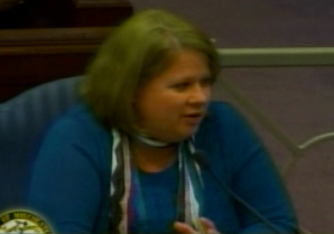
MANCHESTER, NH – Talk about flipping an agenda item on its head.
Alderman Pat Long came before the Special Committee on Alcohol-Drugs-Youth Services Monday night to propose a lifeline of immediate relief for those struggling with addiction by creating a round-the-clock intervention program.
It was supposed to be item 3 on the committee agenda – a discussion over the potential closing of Serenity Place’s detox services – which would eliminate eight treatment beds from the city.
Instead, Long briefly outlined his proposal, which would bring together one of the city’s oldest drug and alcohol treatment programs, Serenity Place, with its newest community recovery center, Hope for New Hampshire Recovery.
“We have heard that, of those who are getting narcanned by EMTs, 50 percent look for immediate help,” said Long. “If we can get even 10 or 20 people the help they are seeking, we’d start reducing the number of overdoses and deaths.”
Currently there is no system in place to assist someone seeking immediate treatment and services for addiction, particularly when they come into contact with emergency responders.
Alderman Long said he and Alderman Joyce Craig worked at solidifying a plan for wrap-around services administered collaboratively by Serenity Place, Hope for NH Recovery and New Horizons, the city’s homeless shelter.
“Alderman Craig talked to Kevin Kintner from New Horizons, and I followed up with him. Turns out there’s an arm from which we can get someone a place to stay, which would be safer than if they were out on the street,” said Long.
Among those who are treated for overdoses by emergency personnel, the ones who say they want to get help are often without a “safe”place to stay while waiting for services, away from other users, said Sharon Drake, Serenity Place CEO.
For those battling addiction, there is only a small window of opportunity, said Drake. Some who get on waiting lists for treatment give up hope of recovery before a bed becomes available.
Some end up dead.
This plan would be the first bridge created in the city to get addicts – and their families – connected to recovery coaches, counselors and available services, whenever they are ready, whether it’s due to an overdose experience, or simply because they walk in the door or pick up the phone. Walk-in hours would be 8 a.m. to 8 p.m., with on-call services between 8 p.m. and 8 a.m.

Hope for NH Recovery Director Holly Cekala said she built a similar program in Rhode Island, and described to the committee how it could work during the on-call hours – someone from a hospital who is aware of the program, a distraught family member with nowhere to turn, or a person simply ready for help, would call the hotline, and a certified recovery support worker would be dispatched to their location.
At that point, an intake assessment is offered to the person, and from there, a next step is taken, whether it’s getting that person connected to a recovery coach, on a waiting list, to a suboxone clinic, or to temporary emergency housing through New Horizons.
Cost of the program, which Long said would start as a six-month pilot to test its efficacy, would be $75,000 for the emergency assessment process. An additional amount would be needed to cover the cost of administrative office space based on the square footage, a figure which Long said he expected to have in time to present the idea to the full board of Alderman on Oct. 20.

In addition, it would be another $40,000 to keep the detox beds open at Serenity Place through the end of December. The plan also would hinge on Serenity Place moving its administrative offices out of the current sober living residential center on Manchester Street, which houses 16 women in recovery, said Drake.
“That kind of triage service shouldn’t be in a residential treatment facility. I have people clean and sober on Manchester Street, and in comes a trigger through the door that could potentially set them back,” Drake said.
It would also potentially make room for more beds.
Cekala said the function of Hope for NH right now is meeting someone’s immediate need, whether they need a meal, a toothbrush, or some moral support. All their services are currently free and reliant on primarily volunteers – peer-to-peer services by those who are in long-term recovery.
“We respect all pathways to recovery, whether it’s faith-based, medication assisted, yoga, or whatever healthy activities without drugs and alcohol a person need. That’s what we do, support a healthy lifestyle,” Cekala said.
Serenity Place also currently operates a transitional living space for 14 men on Brook Street.
Public Health Director Tim Soucy said the plan sounded like a good model to create immediate access to services, and that there may be money available for such community-based solutions through the state Department of Health’s Bureau of Drug and Alcohol Services.
Long also said there could be grants available, or CDGB funding available now, and that the program could qualify for grant money for existing programs once the pilot is up and running and proves itself worthy.
Alderman At-Large Dan O’Neil made a motion to send the proposal to the full board to approve the $75,000 required for the assessment program, plus an amount to be amended Tuesday for the cost of administrative space, as well as the $40,000 to float the detox beds at Serenity Place through December. The recommendation would look for oversight of the money through the city’s Community Improvement Program (CIP), used for capital projects and special programs.
Alderman Bill Barry said based on the latest numbers he’s heard from Manchester Fire Department EMS training officer Chris Hickey, who has designed the drug-prevention program for the school district, one of every 8.4 people who overdose on drugs don’t make it.
“We have to do something as a community,” Barry said. “We can’t just keep talking about it. We have to find the funding somewhere.”
 You’re one click away! Sign up for our free eNewsletter and never miss another thing
You’re one click away! Sign up for our free eNewsletter and never miss another thing







